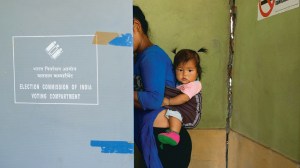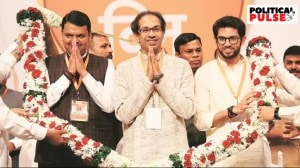- India
- International
‘We are trying to improve online… don’t postpone exams, we don’t know when we will reconvene’
In this E-Xplained session before a nationwide audience on Zoom, Prof V Ramgopal Rao, Director IIT Delhi, discusses challenges posed by the pandemic, and the effectiveness and limitations of online learning.
 Prof V Ramgopal Rao, Director IIT Delhi.
Prof V Ramgopal Rao, Director IIT Delhi.
In this E-Xplained session before a nationwide audience on Zoom, Prof V Ramgopal Rao, Director IIT Delhi, discusses challenges posed by the pandemic, and the effectiveness and limitations of online learning. Edited excerpts:
On coping with the pandemic
It has been a difficult time, I must tell you. It was also sudden, we were not prepared well enough… When Covid struck, within a matter of 10 days, two weeks, we told faculty you were teaching in the classrooms, now you suddenly start doing everything online. The transition was not easy at all. Even personally for me, it was a big challenge. Because with the kind of infrastructure we have on our campuses, with the kind of diversity we have, students from such varied economic and social backgrounds, suddenly to move to an online kind of education was a nightmare. The moment we said we will run classes, there will be a hundred emails from students saying, “But I don’t have a laptop”. We are still struggling… but now I think we are better prepared. Within a matter of a month, at least 300 courses from IIT Delhi went online, but there are still challenges.
I think now the next semester is going to be much better. In fact, we are also bringing back students who have issues with online. We have done a survey: 4% of IIT Delhi students cannot take classes from their hometowns or their places of stay, so now we are trying to bring back these 4% to the campus, make them stay in hostels, even give them laptops where they require them.
How effective is online learning
Online teaching is not just about teaching in front of a camera. The way you behave in a classroom, the way you behave in front of a camera, are very different. If you make Tendulkar act, we know how lousy Tendulkar is when he is in front of a camera. But you make him play and you shoot him while he is at his natural best, he will come across as the world’s best batsman. That is true with some of our teachers too. Some of our best teachers, who are very good at connecting with students in the classroom — the moment they moved online, they just did not know where to start. So the training part also became very important for us.
In a classroom, I can give a one-hour lecture without any issues. But online, if I start lecturing one hour, people get bored very, very fast. We even saw some studies that say 10 minutes is the maximum time that you can hold the students’ attention when you are online. So how do we now give a one-hour lecture in smaller modules when you are online? Another big challenge I see is: On campus a lot of peer learning happens — you learn by interacting with your peers — and that is mostly missing in the online kind of a model…

I hope that we will also be able to move to more hybrid forms of teaching.
Also in Explained | Reading the new education policy
How to make up for peer learning and tutorial system
We are now training many of our faculty on the flip classroom approach, where you make available the lecture content. Some of it can be recorded by the faculty member himself or herself. Some of it may be already available because IITs have been very extensively participating in the NPTEL programme. NPTEL is thousands of courses and all of them are available. So we will also make use of some of the resource material, and students will get to hear the lecture whenever they want. But when you are live with the faculty member, that will be a more discussion kind of session…
But nothing can really beat the classroom and the real-time and the physical. If you ask me, the gurukul way of teaching, what our ancients used to do, is the best form of education, and we have compromised it because we needed to scale up our systems. Now we have reached a stage where the gurukul kind of education is gone, and the hostel kind of education has come in. From here to jump to online and say everything will become virtual is never going to be the same as what we started with…
Certain things can be done very well online, certain things cannot be done well online. IITs are mostly engineering-centric and almost every course has a laboratory component. Those laboratory things, we cannot do anymore… Now, if in December we can start the campuses, we may be okay. But if it further gets extended… that uncertainty is also there. Therefore, now we are no longer saying that we will postpone examinations. We are trying to make use of technology, make use of whatever is available for you… and start closing down the semester, start improving your effectiveness online, and start conducting examinations online… Don’t postpone anything because we don’t know when we are going to reconvene.
On conducting entrance exams
I think joining of the new batch can be delayed, if the examination gets postponed for some more time. We will be able to accommodate that in our calendars. But conducting these examinations is important… At some point, we need to figure out ways of getting back to a normal state by taking all the precautions we need to take. If you are following social distancing norms, if you are wearing a mask all the time… I don’t think anybody should have a reason to complain.
But the challenge again comes down to infrastructure. All these examinations are held in various centres, which are managed by multiple companies. For example, JEE Advanced is conducted by TCS. When we follow social distancing norms, you need twice the number of centres as compared to normal times. We had a certain member of centres, let’s say 80 centres, now you suddenly require 150-160 if you are maintaining social distancing norms. The question is, can TCS make available in these times, another 80 centres? What are these centres and what is their condition… If you are not able to hold JEE Advanced in one centre, the entire exam needs to be cancelled. In JEE Mains that is not an issue; they do it in multiple sessions.
So we have to expand the number of centres, we have to follow social distancing norms, but that costs money. In fact, we have been in negotiations with TCS. These are the challenges.
📣 Express Explained is now on Telegram. Click here to join our channel (@ieexplained) and stay updated with the latest
Audience Questions
On alternative plans if exams are not possible even in September
I would like to believe we will be able to conduct in September. If we are not able to do that… two batches simultaneously is an issue in terms of logistics. But we will have to see what other options we can consider. We can observe a semester kind of a break. If the next semester doesn’t happen, we will be able to still absorb it. December would have been vacation time and May to June-July would have been vacation time. By consuming December and the summer next year, we would have brought things to a normal state at least by the end of 2021.
On the possibility of using artificial intelligence for exams invigilation
We are discussing some of these aspects right now. For example, there are start-up companies developing online evaluation methods. IIT Delhi would like to look into that. The other option is take-home examinations, and as an instructor, I always give students take-home examinations. I used to tell students that even if I am conducting an examination in the classroom, if you say I could not answer this question because I don’t remember, I would give you full marks. We are not testing students on their memory, we are testing them on their cognitive ability, on their thinking.
Transcribed by Mehr Gill
More Explained
EXPRESS OPINION
Apr 20: Latest News
- 01
- 02
- 03
- 04
- 05































